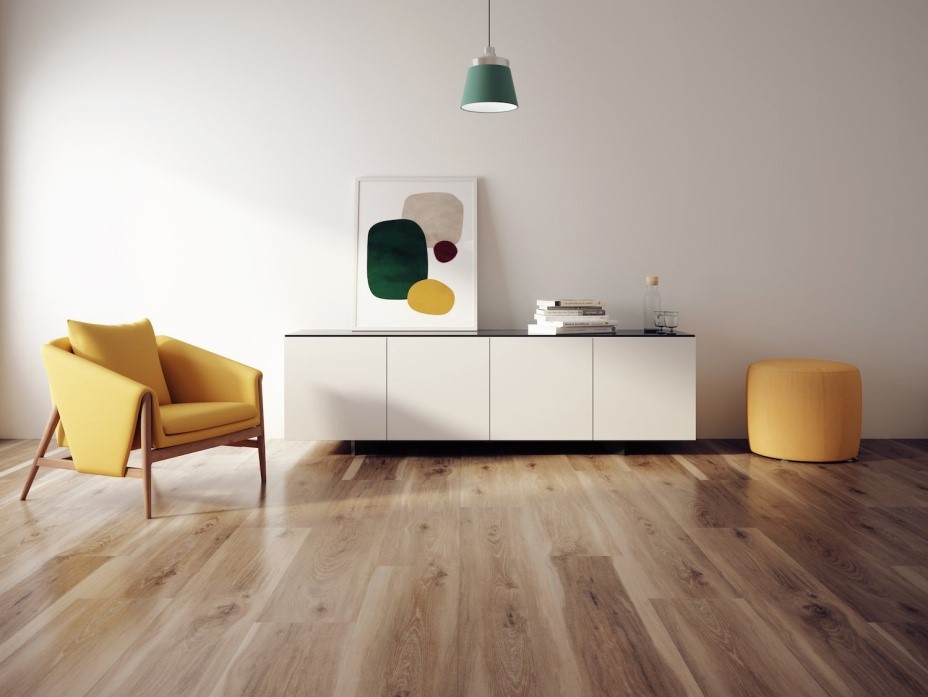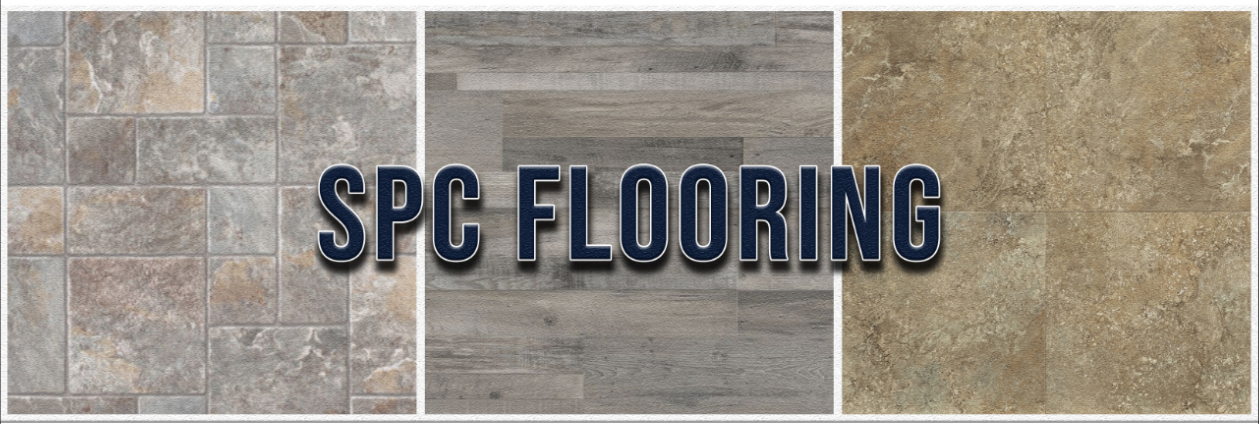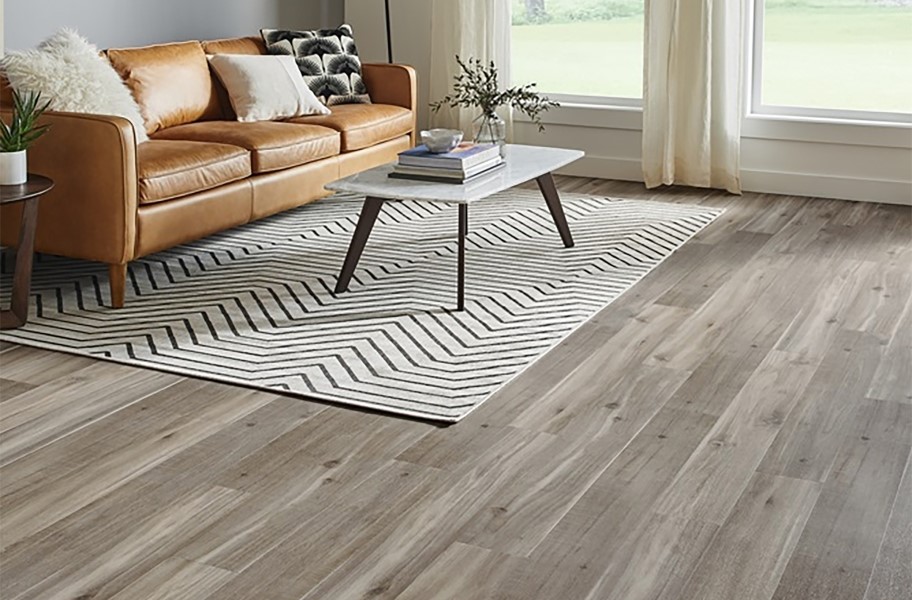LVT floor, SPC floor, and WPC floor are three kinds of famous flooring. In this piece of writing, we will explain these types of flooring and compare them in-depth with each other to assist you to decide which kind will best fit your house. Traditional Luxury Vinyl Tile has been a famous flooring option for years. As buyers continue to demand waterproof, economical, aesthetically pleasing flooring solutions, a host of advanced flooring options such as rigid core vinyls like SPC or WPC are popular in the market. When comparing traditional LVT with options like WPC or SPC vinyl, there are many similarities and differences to take into consideration. To learn more about how these flooring options differ from one another, it is first important to understand what each type is.

LVT (Luxury Vinyl Tile) flooring has elegantly designed, easy to maintain, and has highly durable. LVT reflects the authentic look of natural materials and can withstand a commercial environment. It is designed to replicate hard surface flooring materials such as wood or stone. It is available in tiles as well as planks and use realistic photographic print film and a clear vinyl layer that opens up a wide variety of design concepts. Even the trained eyes might have a hard time differentiating LVT from the materials that it mimics. LTV is manufactured through the following primary processes. Research and development teams evaluate and simulate new concepts through trial error. The raw materials used in the production of LVT include polyvinyl chloride and calcium carbonate. The calendaring process uses a series of heated rollers to squeeze the compound into a continuous sheet. Through the use of heat and pressure, lamination is a continuous process that bonds one layer to the next until all layers are fully formed. The tiles are made of four layers. The backing layer absorbs sound and the fill layer offers stability. Some types of LVT come with realistic 3D visuals and resemble stone or ceramic. The wear layer play important role in the durability of your tiles. Clear coating such as aluminum oxide will keep your LVT flooring from rapidly wearing. The under heat and pressure, engraved rollers apply the textured design onto the face of the product which can be a light deep or tick emboss. During the inspection, the slabs are brought into an air-controlled room that will maintain the same temperature year-round. Once milled, the product is boxed, wrapped, stacked, and ready for shipment.
What is SPC flooring?
SPC (Stone Plastic Composite) flooring is an upgrade version of LVT. It is also called Rigid Vinyl Plank or RVP. It consists of a key ingredient of calcium carbonate on the inner core which is limestone. It is very dense and solid because of the minimal air component which makes the product very rigid.

This rigidity is essential because you can mill in your joint structures. You can click and install SPC flooring similarly to a laminate floor. It can bridge slight undulations in the substrate so you don’t behave to be as pedantic as you would with vinyl and traditional vinyl products.
SPC flooring is a bit expensive and because it’s so dense the sound and the feel of the product can be a little bit hard on the ear and on the foot. Generally, all products of SPC come with a built-in underlay. There are various options available from cork, IXPE, or various rubber components, however, it is a lovely product. In cleaning and maintenance, all of the mentioned products are much the same.
The SPC flooring is rigid which is why have much more resistant to heat and temperature, therefore, is very suitable for the area with high temperature. It can be installed easily and quickly, and you don’t have to worry about the sun bearing down on the product.
What is WPC flooring?
WPC (Wood Plastic Composite) is typically manufactured of calcium carbonate, polyvinyl chloride. It is named for the wood like materials from which it is manufactured and becoming a popular option in the market for replacing wood materials. It is vinyl tile flooring that has a rigid core constructed from either recycled wood pulp or plastic or polymer composites that are expanding with air. Sometimes it is known as wood polymer composites that are expanded with air. WPC has low density, lightweight construction which is soft and warm underfoot with greater comfort.

Let’s look deep into LVT, SPC, and WPC
Let’s take an in-depth look of the similarities and differences between LVT, SPC, and WPC flooring.
Comparison in Appearance
SPC and WPC vinyl flooring manufacturers used modern digital imaging technology. The manufacturers produce WPC and SPC flooring in a realistic appearance that reflects the look of real timber and stone tiles. Both types of flooring can be found in different styles, colors, and textures. Due to the thin plank structure of traditional LVT flooring tend to project a look and feel that is expected of vinyl. It is very true for the budget LVT options.
Comparison in Construction
The WPC and LVT construction is the most important difference between these two vinyl flooring. WPC flooring has more stable and solid because of its wood-plastic composite core. Vinyl flooring has a primary PVC core that makes it a rubber product, meaning it can flex and move easily.
Comparison in Structure
LVT, WPC, and SPC flooring types feature layers but these layers can differ between types. For insistence, LVT consist of a UV coating that protects the flooring colors such as décor and wears layer. While SPC flooring has a core layer comprised of stabilizer, calcium powder, and PVC powder. LVT core layer is comprised of Calcium powder, PVC powder, and plasticizer. While WPC floors feature a core layer consist of an LVT layer and a foaming agent.
Comparison in Installation methodology
All of these flooring types feature DIY potential. Most of the WPC and SPC flooring feature a DIY click and lock system consisting of a tongue and groove construction that eliminated the need for glues or nails. On the other hand, LVT planks can often be found with loose lay, glue down, or click-lock installation.
Comparison in Sturdiness
Because of the differences in the core materials, SPC tends to be the most dimensionally stable among these flooring options. Also, the sturdiness helps the floor feel softer and increases its defenses against dents and wear.
Comparison in Scratch Resistance
Because of the rigid core construction, WPC flooring is less likely to scratch and dent. However, still it is softer flooring that is not safe from the threat of scratch and dents. Traditional LVT floors are soft and pliable, which makes them protected to become an easy target for dents from heavy furniture. SPC vinyl comprised mainly of stone makes them superior resistance to scratch and dents as compared to WPC and LVT flooring. This makes SPC vinyl a top contender for commercial applications or areas of high traffic.
Comparison in Plank Thickness
WPC vinyl flooring tends to run thicker than standard SPC vinyl that tends to stay between 4mm to 6mm thick. WPC vinyl floors are thicker than standard LVT vinyl. Whereas traditional LVT is typically 4mm or less, WPC vinyl flooring ranges from 5mm to 8mm thick.
Comparison in water-resistance
Whether it is SPC flooring, LVT flooring, or WPC all of them are highly water-resistant. This quality makes them a suitable choice for installation in wet areas such as washroom and laundry room.
Comparison in Comfort underfoot
LVT flooring tends to be thinner and lacking in support. Adding underlayments can help LVT floors feel thicker and softer. Because of the rigid core, the WPC flooring feels softer underfoot than SPC or LVT vinyl. This is also because of a foaming agent used in the core that gives it added cushioning. SPC is consists of fillers, limestone which offer a more sturdy feel underfoot. Underlayment support will help your SPC to feel softer.
Comparison in cost
Traditional LVT flooring is the least economical one among these flooring types. If you want a more substantial option, the extra cost per meter might be worth it for WPC or SPC flooring. Among these types, the WPC flooring is the most expensive one. Whatever type you choose, remember the attached underlayment, wear layers or any other feature will increase the price.
Comparison in Application area
SPC and WPC flooring, like other vinyl floorings, can be installed above and on grade. Also, these types of flooring can be installed in the commercial areas as well as in wet areas such as laundry rooms and washrooms. However, WPC flooring is best for residential areas while SPC vinyl is suitable for commercial application.
WPC flooring has rigid core construction which is useful for hiding subfloor imperfections. Whereas LVT or glue down LVT may transfer any unevenness from the subfloor to the surface, WPC can be used over cracks or divots in wooden or concrete subfloors.
Comparison in Subfloor
Traditional vinyl is flexible and thin, making it susceptible to subfloor imperfection. WPC flooring is thicker helps compensate for the majority of minor subfloor imperfections.
Need Help? Contact us
We provide the information in this article to help you to know which type of flooring is good for you to buy. Still, if you have questions or want to know additional advice about LVT, SPC or WPC flooring then feel free to contact Anyway flooring. Our experienced professional would be happy to guide you.
English
Русский
العربية
Français
Español
Português
Deutsch
italiano
日本語
한국어
Nederlands
Tiếng Việt
ไทย
Polski
Türkçe
አማርኛ
Bahasa Melayu
ဗမာစာ
Filipino
Bahasa Indonesia
magyar
Română
Čeština
Српски
हिन्दी
فارسی
Kiswahili
Slovenčina
Slovenščina
Norsk
Svenska
українська
Ελληνικά
Suomi
Հայերեն
עברית
Dansk
اردو
বাংলা
Hrvatski
Eesti keel
नेपाली
latviešu
Euskara
Български
Català
Hausa
íslenska
Lietuvių
Malti
isiZulu














